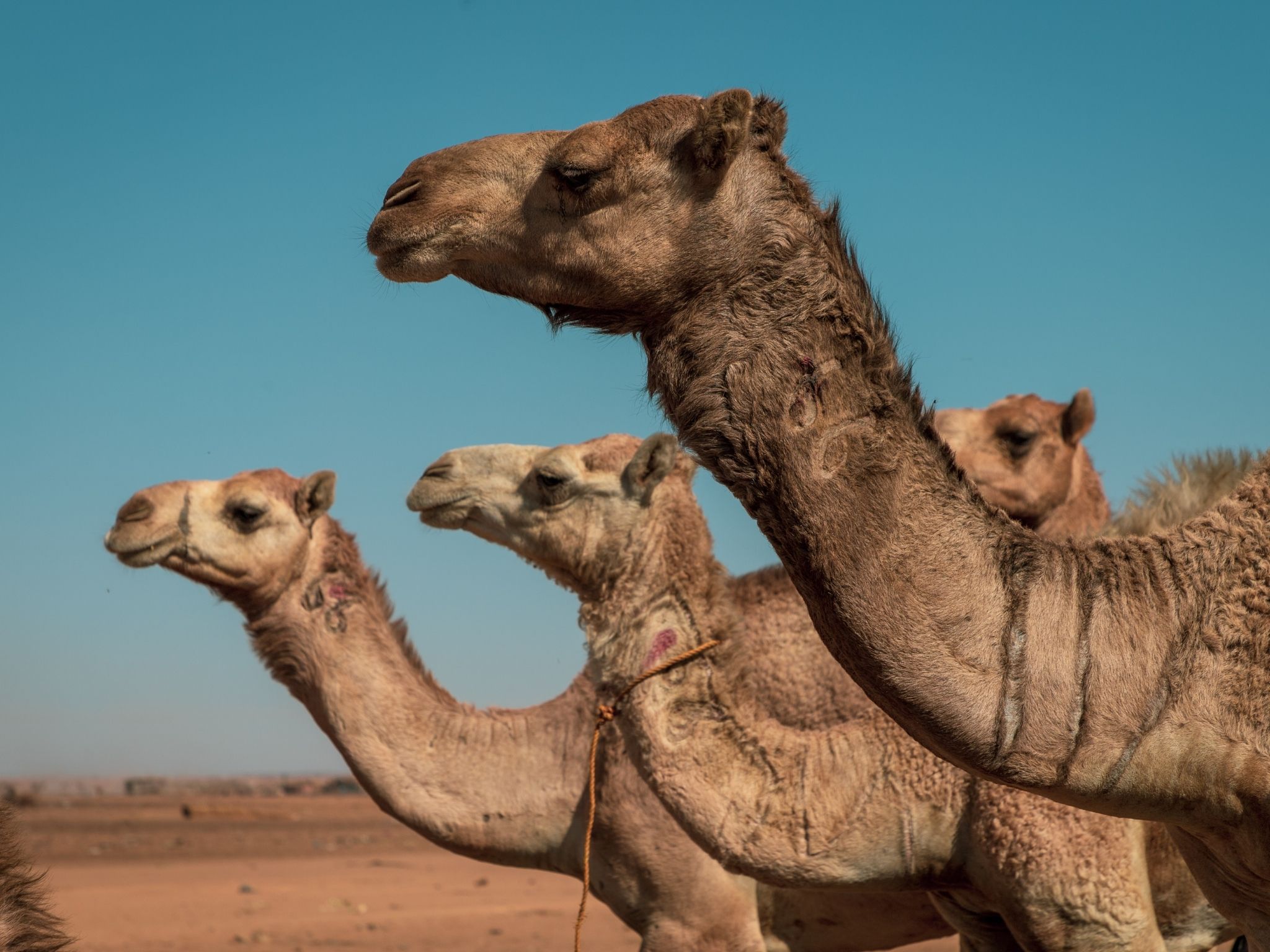Are you planning to go to Sudan? You’re in the right place.
In this article you will find travel tips for Sudan, movies and books about the country to go deeper into the culture, a bit of history to better understand the country and some facts to get you situated.
Looking for what to pack? You can find our packing list for Sudan here.
Below is a little history lesson on Sudan to better understand everything that has made the country what it is today. To skip right to our travel tips, click here!
A brief history of Sudan
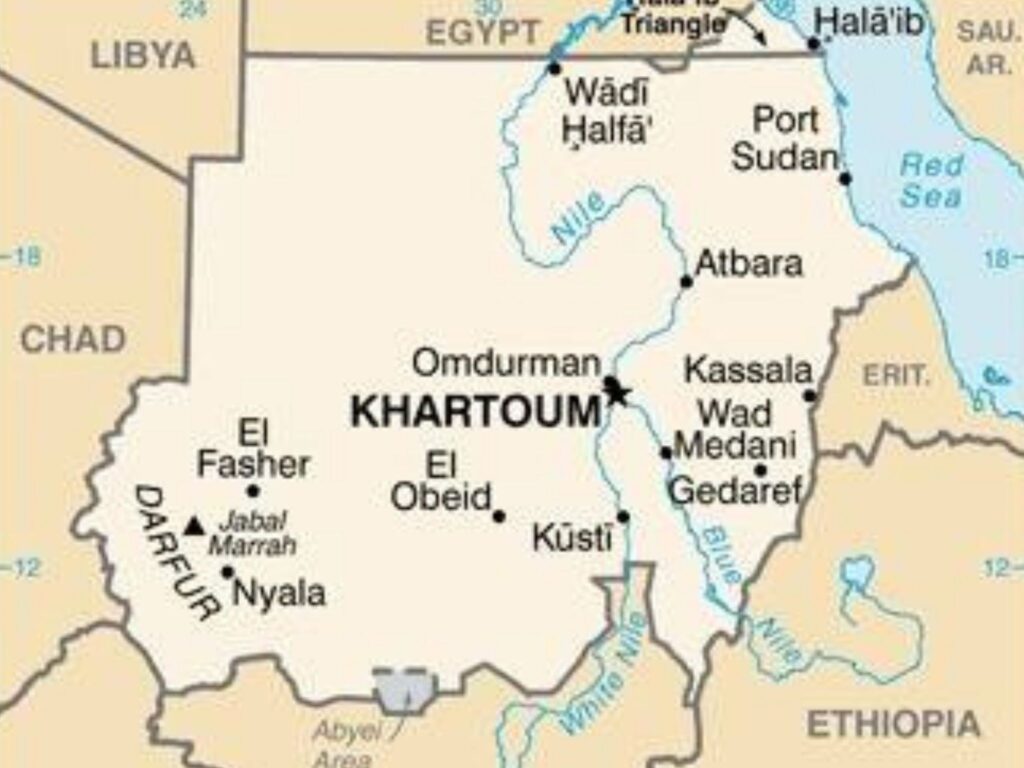
Our Sudan travel tips start with a bit of historical background that is very helpful in understanding the country today.
Sudan is home to some of the oldest countries in the world with a thriving culture inhabiting its borders over 4,500 years ago, during Pharaonic times, and equally, being one of the youngest countries since the change in borders with the independence of South Sudan in 2011.
Today’s Sudan was ruled by the Kingdom of Kerma, the Egyptian New Kingdom and the Kingdom of Kush, which also ruled over Egypt, since 2,500 BC until 350 BC. The Kingdom of Kush, which built Jebel Barkal and the Meroe Pyramids, was mentioned in the Bible as saving the Israelites from the Assyrians.
This Kingdom build many of the structures, temples and archeological sites that are still visible and open to visitors today and which form the core of the country’s historical tourist sites.
With the fall of the Kingdom of Kush at the hands of the Assyrians, the Nubians formed the Christian civilizations which thrived during Medieval times until they were invaded by nomadic Arab tribes.
The Nubians developed their own alphabet based on the Coptic and women enjoyed very high status. The Nubian Kings followed a matrilineal lineage with the son of the King’s sister inheriting the throne.
Arab kingdoms dominated Sudan for centuries and islamisation progressed until the Ottoman Empire arrival in Sudan from Egypt in the 19th century.
At that time, slaves had become the major payment currency for trade establishing a south-north corridor that sold salves from South Sudan through Egypt and onto the Ottoman Empire.
During the 19th century, Egypt ended up conquering the entirety of today’s Sudan. With the British occupation of Egypt, Sudan ended up becoming a condominium under British-Egyptian control.
Egypt obtained independence in 1952 and its first president, who was half-Sudanese and was raised in Sudan, worked to get Sudan’s independence which was granted in 1956.
Unfortunately, democracy did not bring peace to Sudan. Freedom was followed by a civil war that erupted after the first president instated Islamic rule and ignored the country’s religious and ethnic diversity.
The conflict between the Muslim north and the animist and catholic south ensued and continued for decades until the south became an independent country in 2011.
In parallel, Omar Bashir rose to power in 1989 through a military coup and remained as a military dictator until he was ousted by a coup in 2019.
Between 1983 and 2020, Sudan became an Islamic state following strict Shariah Law. Although since 2020 the country is a secular state, Islamic Law remains strong. Alcohol and music are still forbidden and men and women dress conservatively.
During Bashir’s rule, the country hid Osama Bin Laden and was listed by the US as a State Sponsor of Terrorism. Embargo and international trade restrictions have kept Sudan largely isolated from the rest of the world and kept it underdeveloped and affected by flooding, high inflation, lack of foreign currency and sanctions.
In 2000 the conflict in Darfur erupted with an Arab rebel group attacking the non-Arab Muslim population of Darfur in the west of the country. The Government-sponsored rebel groups have killed more than 300,000 people and displaced over 5 million since the conflict started in 2003.
Unresolved, Darfur remains the worst humanitarian crisis the world has seen, spanning almost two decades and promoting the world’s largest relief operation.
This further isolated Bashir who was charged with various accounts of genocide and crimes against humanity by the International Criminal Court. In 2019, Bashir was first imprisoned and later escaped and is now at large most likely hiding in Saudi Arabia.
The country has been attempting to peacefully transition to democracy since 2019 with joint military-civilian governments interrupted by ongoing protests.
The country’s international relations have improved since 2017. Sudan was removed from the list of states sponsoring terrorism in 2020 after 17 years.
Quick Sudan facts
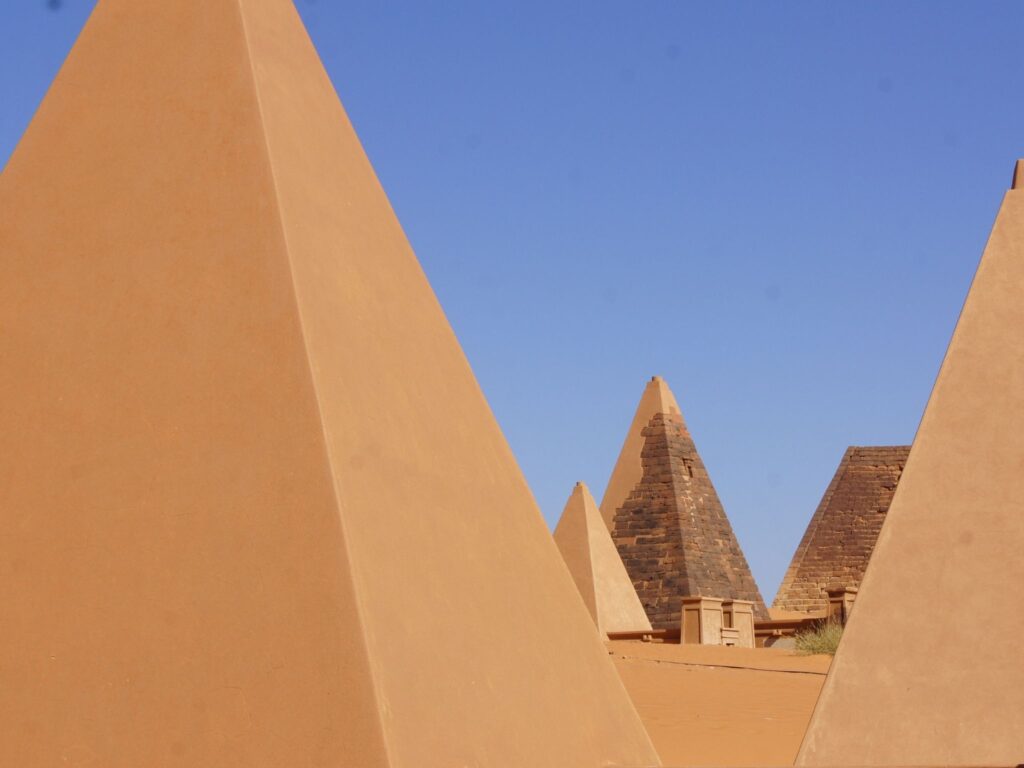
Below you’ll find some quick fire facts to get you started on our Sudan travel tips.
- The word Sudan means “The land of blacks” in Arabic.
- Before the split between the north and the south in 2011, Sudan was the largest country in Africa. South Sudan is today the world’s youngest nation.
- The Nile becomes such in Khartoum where the White and Blue Nile merge. You can actually see both tributaries converge and can take a boat trip to get up and close with this amazing phenomenon.
- There are more pyramids in Sudan than in Egypt, most of which are in UNESCO-listed Meroe and we will be visiting them during our trip.
- Sudan is a young country with 60% of the population below the age of 20.
- Jacques Cousteau set up Continental Shelf Station Two during WWII in Port Sudan to conduct underwater research. The work was included in the documentary World without sun.
Sudan travel tips
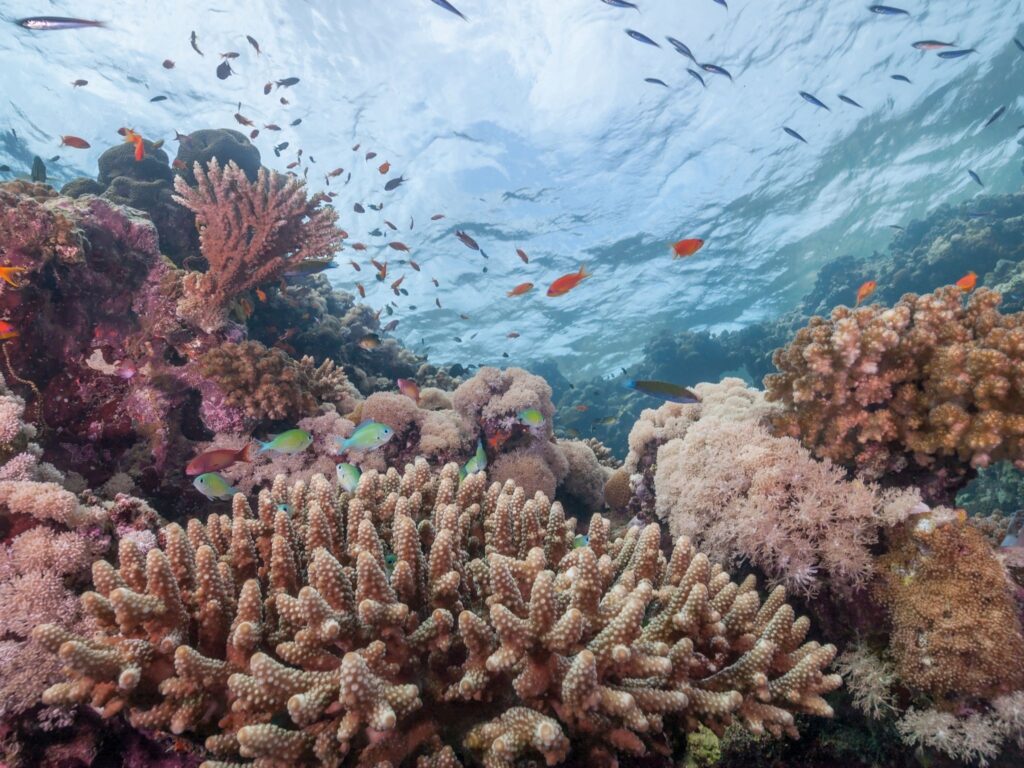
Sudan is a culturally-rich country but there are a few important and very specific things you need to know before visiting.
Note: This list of travel tips to Sudan is written considering a group tour. Independent travel requires securing permits to archeological sites, road controls, etc. that are not discussed in this list.
Essentials
Let’s start with some basics.
- Sudan uses the New Sudanese pound as currency. US Dollars and Euro can be easily exchanged but note that you will NOT be able to exchange back any pounds into a foreign currency, what you exchange is what you will have to spend.
As a result of the embargo, credit cards are not accepted anywhere in Sudan and ATMs do not exist. Plan to bring all the cash you will need and an extra safety stash just in case.
- Stay connected if you must. We advocate for a digital detox, and Sudan is the perfect occasion to do so because WiFi access will be limited outside of Khartoum. Hotels in Khartoum offer WiFi and the guest house in Karima has electricity and WiFi all day although with unstable slow connectivity.
At the Meroe tented camp, electricity and internet are only available from sunset till 11pm and in the temporary tented camp in Soleb there will be no electricity or internet.
Mobile connectivity, while improving, is still unreliable outside of Khartoum. If you wish to stay connected, you can buy a local SIM card but make sure to let us know so we can organize one in advance. Alternatively, ESIM providers like AloSIM or Airalo offer data packages for Sudan and Africa, though expect reception to be generally spotty.
To use a local SIM card or ESIM, make sure your phone is unlocked by your telecom provider back home and for just a few dollars you’ll be able to share your experience on social media.
- Don’t be fooled by the weather. As explained in our Sudan packing guide, the weather can change a lot from day to night with variations of 10-15 degrees Celsius.
Although days will be hot, as soon as the sun sets, temperatures can drop in the desert and sometimes, they catch travelers unprepared. Don’t forget to bring a jacket.
- Pack light and soft. We will be moving about in 4WD cars, will be changing accommodation several times, and will be staying places that are often surrounded by sandy surfaces. While there will usually be staff ready to lend a hand, there is nothing more mindful than packing light.
Passports and Visa
Sudan’s isolation means that border controls are strict and getting in and out of the country or moving around requires a lot of paperwork.
- Process your visa in advance. Almost everyone will need a visa to visit Sudan. This needs to be processed about 2 months before your trip. You should not start the process earlier because the visas are only valid for 2 months from the date of issuance so if you start too early, the visa validity may expire before your trip.
Visas can be obtained either at the Sudanese embassy where you live, or on arrival. If possible, getting a visa before the trip is recommended. Not only is it usually cheaper but it will also save you from a long queue on arrival in Sudan. However, you should check ahead of time if the Sudanese embassy where you live issues visas, not all do.
To obtain your visa, you will need to fill in a form and get an invitation letter from a local tour company in Sudan, both on arrival or at the embassy. A fee will have to be paid at the embassy or on arrival to get the visa stamp on your passport.
Important: Visas for Sudan will only be issued to those who do not have an Israeli stamp on their passports. If you do, make sure to renew your passport so it’s clean when you apply for the visa.
- Passport registration: If you are planning to stay in Sudan for more than 3 days, you will need to register at the local police station. Failing to do so will prevent you from leaving the country as they need to see the registration stamp to let you depart.
If you are coming to Sudan on our group tour, your passport registration will be taken care of by the local operator.
- Passport validity. Besides the visa fees, travelers to Sudan need to ensure they have a passport that is valid for 6 months after their departure and that has at least 2 empty pages.
Health and safety
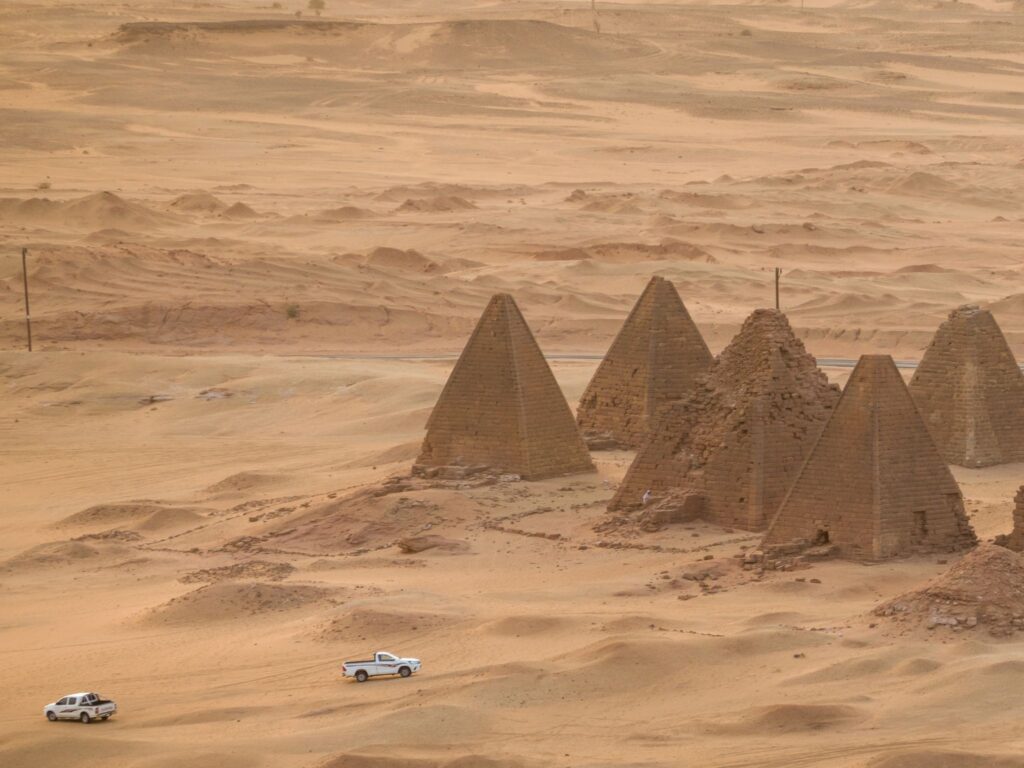
Heath and safety is important when traveling. Nobody wants to be sick when overseas and when traveling long distances, eating foods we are not used to and sleeping in a different environment, it is much more likely to be a bit under the weather. Here are a few health tips to consider.
- Get vaccinated in advance. Traveling to Sudan may also require you to take the necessary precautions to keep yourself safe from potentially deadly diseases. Beyond the COVID vaccine, there are other recommended inoculations.
Consult with your doctor ahead of the trip, at least 6 weeks before departure, so you leave enough time for the vaccines to take effect. Depending on where you live, some vaccines may not be immediately available from your GP and may have to be ordered.
The CDC recommends vaccination against meningitis, hepatitis A and B as well Typhoid fever. Malaria prophylaxis may also be recommended although mosquitoes are very rare in the winter months in Sudan.
Yellow fever vaccination will be required if you transit or come from an endemic area such as Kenya or Ethiopia.
- Bring all the medication you’ll need. We will spend the majority of the trip away from Khartoum and from any urban center. This means you can’t easily replenish your medication or even buy paracetamol so you should bring enough for the duration of your trip.
IMPORTANT: Make sure any prescription medication comes in its original pharmacy packaging, and with the corresponding doctor note and prescription to avoid issues at the border. It is your responsibility to check that whatever medication you bring can indeed be taken into Sudan. What may be legal in your country, or even sold over the counter, could be a controlled substance elsewhere. More details here.
- Bumpy roads. We will spend a significant amount of time on unpaved roads, through sand dunes and on bumpy roads which can be your worst friend if you are prone to getting car sick.
- Get that coverage. We never leave the house without purchasing extensive medical and travel insurance coverage and this is why we make it mandatory to join our tours, but in the case of Sudan this is extra important.
Unexpected accidents do happen, and given the remote nature of the trip, even the smallest of incidents may require medical evacuation, sometimes even on a medically-escorted flight. The cost of that could run in the hundreds of thousands.
I broke an arm falling from a horse in South Africa and my medical bill was $20,000 and a colleague of mine was stung by a stingray while going for an evening walk on the beach in Zanzibar and needed to be airlifted back to Dubai the cost of which ran into the 6 figures.
It’s worth noting that the best travel insurance will differ for each traveler, depending on the nature, style, and length of their trip, so we recommend using an aggregator and comparison tool such as Travel Insurance Masters to find the right one for you depending on what coverage you want, age, location, trip, etc.
Important: If you are on an annual insurance plan, confirm that your policy will cover you in Sudan, in many cases it does not. Even if it does, it is most likely that you will have to pay for the necessary care and then claim the reimbursement via your insurance provider. Bring extra cash in either USD or EUR in case that situation arises.
- Crime. Petty crime and theft is uncommon in Sudan and outside of Khartoum, practically inexistent. Normal precautions should be taken.
IMPORTANT: When we conducted our first Solo Female Travel Survey, one of the most relevant take-aways was that women who travel solo unanimously worry about their personal safety. The best countries for first time solo female travelers all have safety in common. That’s why we created the first and most complete resource for women who travel solo to find safety information by country or destination.
With safety data coming from the US and UK Travel Advisories and the Global Peace Index, the index considers factors like the risk of theft, scam and harassment, as well as analyzing attitudes towards women in each country to rank each country from 1-4, 1 being the safest and 4 being the most dangerous for solo female travelers.
Sudan is currently rated as high risk for solo female travelers on our safety index. Exercise caution and review our safety tips for solo female travelers to ensure you stay safe and have a rewarding and empowering travel experience.
- Don’t drink the water. Diarreah affects as many as 40% of travelers. It is not only the fact that water may not be potable or drinkable in most places but also that you may not be used to the same kind of water.
In Sudan, it is best not to drink the tap water and opt for purified water. To avoid single-use plastic, we provide all guests with unlimited drinking water from a large container you can refill your personal bottle from. We also recommend bringing purifying tablets or a purifying water bottle.
- Public toilets. Public toilets are not available outside of Khartoum. This means bush toilets are the only way. Bring hand sanitizer, tissue, liquid soap and wet towels to wash your hands.
Local culture and customs
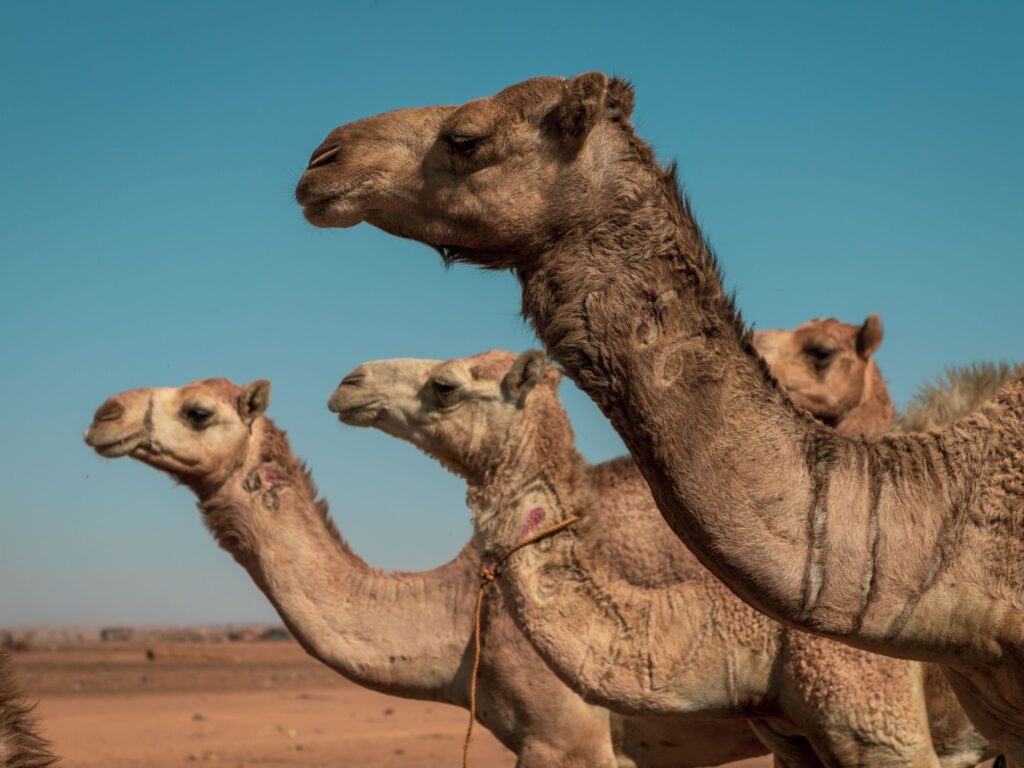
Our travel tips for Sudan would not be complete without talking about the local customs and culture in Sudan which, for most of us, is probably different from what we are used to
- Cultural diversity. Sudan is very culturally diverse. Although most of the population is of Nubian origin and Muslim, there are many tribes in the country and each of them speaks a different language and follows their own traditions and customs.
While Khartoum can feel like any North African or Middle Eastern city, outside the capital, life is simpler and nomadic in nature.
- Dress appropriately. Sudan is a very conservative Islamic country where dressing appropriately shows respect for the local traditions and stay culturally appropriate.
Dressing conservatively generally means long trousers, dresses or skirts. You do not have to cover your head in public, only when entering mosques.
- Ask for permission not forgiveness. During your trip in Sudan, you will undoubtedly meet colorful locals, beautiful women and children and will find yourself in many situations where the scene is just stunning and worthy of capturing on a photograph.
While locals are always friendly, you should be mindful and ask before taking photographs. Avoid taking photos of minors without the parents consent.
Taking photographs of military installations, airports, bridges, official buildings or markets is not allowed and could get you in trouble. Always ask the guides before taking any photo.
- Bringing gifts. Tourism is still in its infancy in Sudan and begging from tourists is uncommon. If you wish to bring gifts for the local school, pencils, pens and markers will be appreciated and donated to the teachers. Giving anything to children is strongly discouraged.
Local Sudanese women have a hard time accessing cosmetics and other beauty products such as perfume, so if you want to bring small samples they will be appreciated. Any clothing can be collected by our local partner and donated to the refugee camps.
- Learn some basic Arabic. Knowing some basic words can be useful to communicate with the locals, show politeness and respect. We have included some basic words below.
Useful Sudanese Arabic words
Almost all Sudanese speak Arabic and one of the many other languages spoken by the more than 600 ethnic groups in the country.
While Arabic is spoken in many countries in the world, every country has a different accent and dialect. Sudanese Arabic is quite similar to that spoken in Egypt.
- As Salaam Alaykum: “Peace be upon you”, used as a greeting or to say hello. The response should be “Walaykum As Salaam”, which translates as “and upon you too” but is a response greeting.
- Marhaba: Welcome.
- Ahlan: Hello.
- Keef: Ok.
- Tamam: Ok / Good.
- Aiwa: Yes.
- La: No.
- Mind fadlak: Please.
- Shukran: Thank you.
- La, shukran: No, thanks.
- Kwayes?: How are you?
- Alhamdullilah: “Thank God”, but used as a response to how are you to say that you are good, thank God.
- Inshallah: “God willing”, a word added to the end of many sentences.
Local cuisine

Traditional Sudanese food is very similar to Egyptian food. Typical recipes from the Levant (Lebanon, Jordan, Israel) such as hummus, are also commonly found in Sudan even though they are not local, especially at restaurants and hotels in Khartoum.
As a majority muslim country following strict Islamic laws, you won’t find any pork or alcohol in Sudan and all food sold and eaten is Halal.
Because of its location on the Sahara Desert, the opportunities to grow fruit and vegetables in Sudan are limited by the climate and soil conditions. Except for the coastal area of the Red Sea, seafood and fish is also rarely found.
Instead, many Sudanese live off herding cattle and therefore, lamb, chicken, goat and beef are the most commonly found protein. Pulses (peas, lentils, etc.) and grains are also staple foods and the main starch is made from wheat, either as a fermented flat bead or as a porridge.
Sudanese tend to eat with their hands and use bread as a vessel to gather the food, though cutlery is usually offered. Only the right hand is used to eat, as the left is considered dirty.
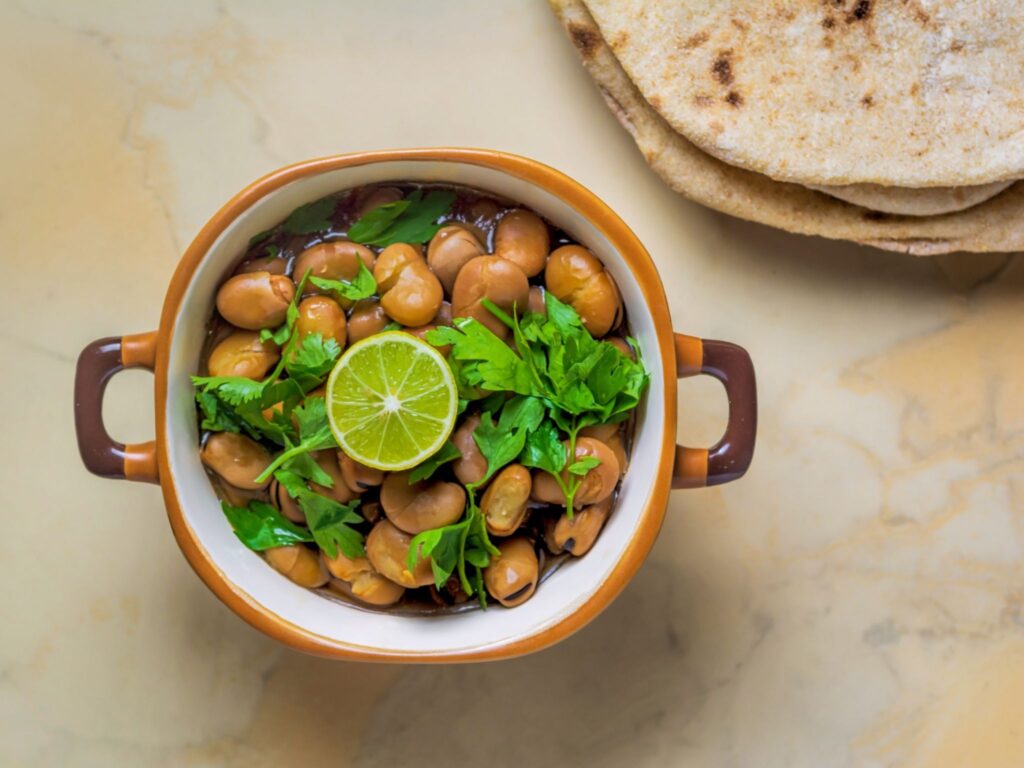

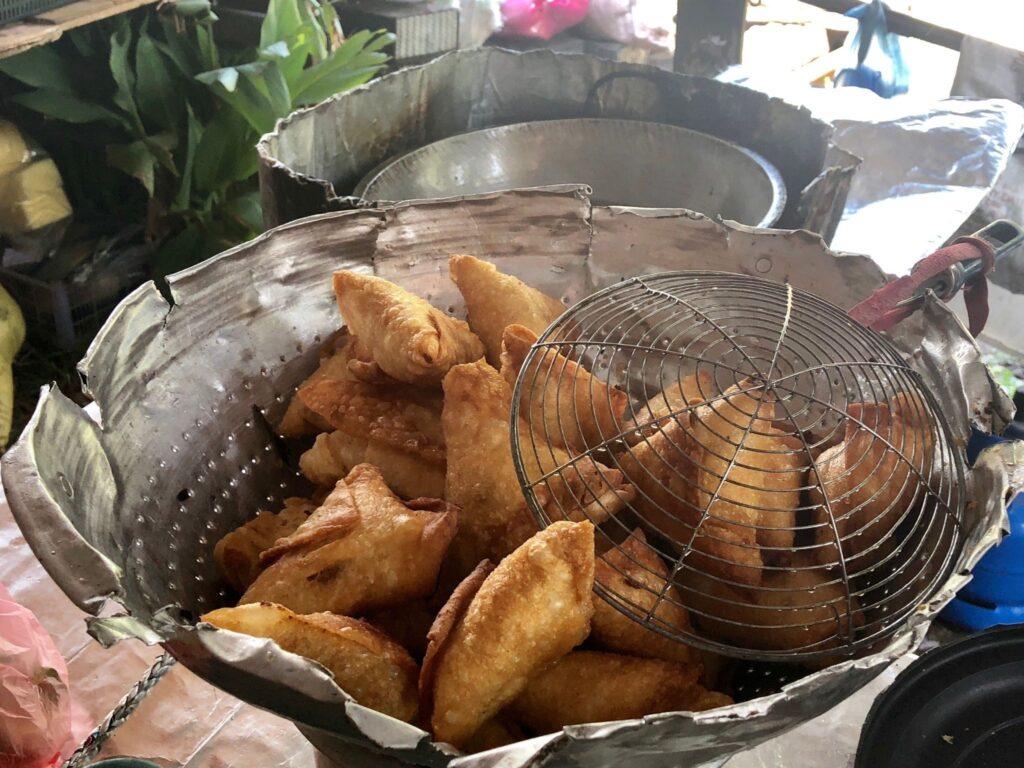
Below are some dishes that you will most likely find in Sudan:
- Flat bread. Most meals in Sudan will be accompanied by flat bread similar to chapati or to a thinner version of a pita bread. It is very mild in flavor and not savory or sweet, but very neutral in taste so that it can easily support any dish.
- Samosas. This Indian snack is also commonly found in Sudan and eaten as an afternoon snack.
- Foul medames: This Egyptian dish is a broad bean stew that is also commonly found in Sudan.
- Grilled meat: Grilled goat, beef or chicken are commonly eaten in Sudan.
- Meat stew: Sudanese eat a lot of meat stews slowly cooked with vegetables (carrots, potatoes) and spices and eaten with bread.
- Assida: This wheat flour based porridge is commonly served as the side dish to a stew or meat recipe.
- Kisra: This flat bread that looks like a crepe is fermented bread made from sorghum that is similar to the injera that is eaten in Ethiopia.
- Tea. Moroccans love to drink tea. This is usually green tea steeped in a shinny silver pot, and often stuffed with mint leaves. It is served steaming hot, poured from a distance from pretty silver pots, sweetened with a lot of sugar and drunk from tiny glasses.
- Coffee. Coffee in Sudan is like the coffee in Egypt and Turkey, strong, thick and cooked in small pots over fire.
- Hibiscus tea: Hibiscus tea is a very typically found drink in Sudan. Pink and usually sweetened, it’s a great afternoon pick me up.
- Fruit juices: Because there is no alcohol in Sudan, tea, coffee and fruit juices receive extra attention. Lemonade with fresh mint, fresh watermelon juice or even an orange juice taste sublime in Sudan.
On our tour through Sudan, we will be enjoying cold picnic lunches en route including sandwiches, cold salads, pasta, etc. and hot dinners at the hotels.
Tipping in Sudan
Tipping is always a personal decision based on the service you have received. Tipping in Sudan is not common but if you are satisfied and wish to tip the guide and drivers, you will be most welcome.
Books about or set in Sudan
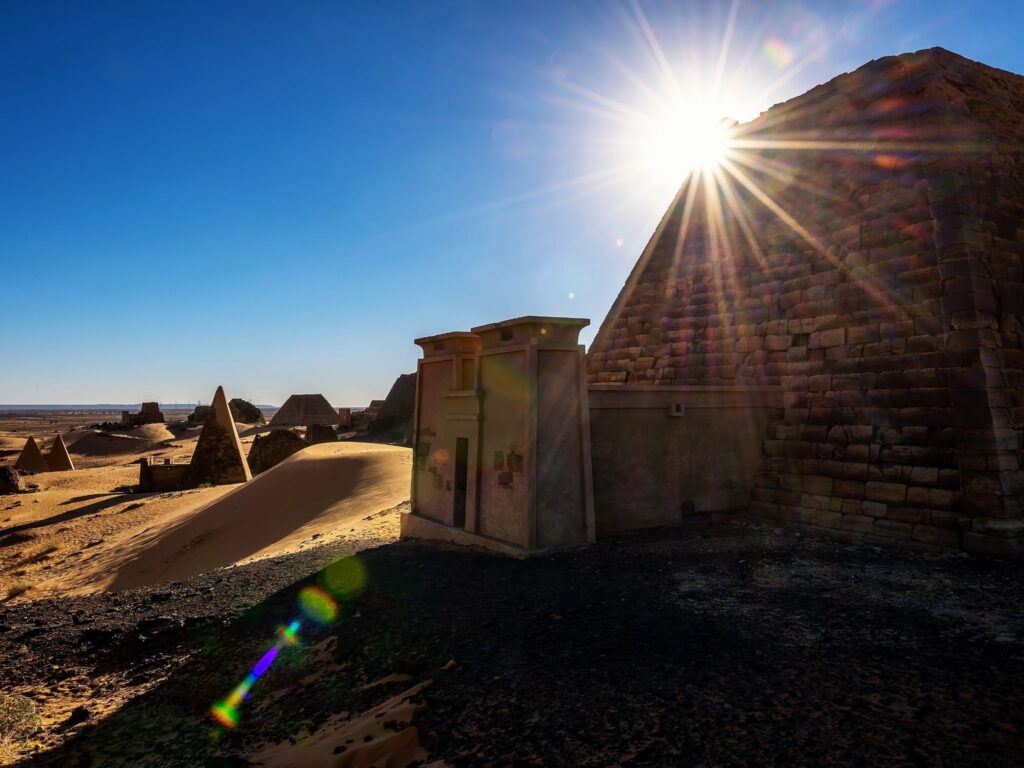
There aren’t a lot of books about or set in Sudan in English. Partly because of repression following the 1989 coup and the imposition of Shariah Law and partly because many writers, artists and intellectuals left the country, Sudanese literature is not as vast as that of other countries.
Because understanding a country as diverse, oppressed and closed off as Sudan is, is difficult unless done through the eyes of the local, I hope that this list of books will help you learn more about the country.
- Season of Migration to the North by Tayeb Salih: A classic book from 1966 Sudan that traces the trip to Europe of the main character. This is considered one of the most important Sudanese Novels.
- The Book of Khartoum by Ralph Cormack and Max Shmookler: A compilation of stories that will help you better understand the capital, a far cry from the rest of the country which remains rural and nomadic.
- The Sudan Handbook by John Ryle: Perhaps the first book you should read about Sudan because it tells the country’s history from the time of the Pharaohs. The Sudan handbook covers both north and south Sudan
- The Grub Hunter by Amir Tag Elsir: A novel helpful to learn more about what it’s like to live under a repressive regime like the one which has ruled over Sudan for 30 years under Omar Bashir.
- Khartoum at Night; Fashion and Body Politics in Imperial Sudan by Marie Grace Brown: An important book to better understand the role of women and how it evolved a the beginning of the 20th century until the country’s independence from the British.
- A Line In The River: Khartoum, City of Memory by Jamal Mahjoub: The writer takes us back to Sudan where he returns 20 years after escaping from the 1989 coup.
- Thirteen months of sunrise by Rania Mamoun: An account of contemporary Sudan through the eyes of various characters.
- A History of Modern Sudan by Robert Collins: Sadly, Sudan’s modern history is tragic. Since independence, it descended into violence that culminated in a repressive regime that committed crimes against humanity in Darfur and elsewhere. To understand today’s Sudan, one has to read about its history.
- War Child by Emmanuel Jal: Biography of British rapper Jal who was one of the Lost boys of Sudan, children of Southern Sudanese families killed in the conflict and conscripted into the Liberation Army as child soldiers. He was adopted by a British aid worker and escaped, today telling his stories through rap lyrics.
- Tears in the desert: A memoir of survival in Darfur by Halima Bashir: The first account of the war in Darfur written by a woman recounts the horrific incidents that make Darfur one of the most tragic wars of the 20th century.
Movies about or shot in Sudan
As a result of the many years of Islamic law, it has not been possible for movies to be shot in Sudan.
- You will die at 20: A movie about a boy whose village holy man cursed with a death by 20. One day he turns 19.
- Machine gun preacher: Premiering in Toronto, the movie is biographical and follows a biker turned preacher who is working to save children of South Sudan together with the Sudanese People’s Liberation Army when he sees the atrocities of the war after a missionary trip to Uganda.
- Khartoum offsite: A 2019 movie about women playing football in Sudan, a forbidden activity for women to engage with, is the center piece of a movie directed by a Sudanese women, in a country where women are not allowed to direct movies either.
- Talking about trees: Movie that follow four Sudanese men and their efforts to bring movie going back to the country.
- The constant gardener: This award-winning drama starring Ralph Fiennes and Rachel Weisz happens between London, South Sudan and the slums of Nairobi and follows the ethical deliverations of an activist, a doctor and the various echelons of the British Foreign Office trying to hide the failing of a future drug for big profits.
- Darfur: Action drama movie that follows a group of journalists reporting on the tragedy of Darfur.
- We come as friends: Premiering at the Sundance Festival, this is one of those rare movies that has a high rating on all online review websites and with the public. Sobering and raw, the documentary follows the fight for independence of South Sudan from the North.

